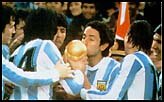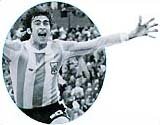|
 Having reached the Final in 1930, Argentina had to wait a while before winning the World Cup, which it eventually did on its own soil in 1978. But the success of César Luis Menotti's men, at the expense of the ill-fated Dutch, came in a troubled political climate. Having reached the Final in 1930, Argentina had to wait a while before winning the World Cup, which it eventually did on its own soil in 1978. But the success of César Luis Menotti's men, at the expense of the ill-fated Dutch, came in a troubled political climate. |
Rarely has the run-up to a World Cup been so filled with controversy as the 11th tournament, held in Argentina. Football, in fact, took a back seat as the powers that be debated whether or not to boycott the tournament in protest against General Videla's totalitarian regime and its violation of human rights. Finally, however, despite a widespread call to stay away, the world's footballing nations all made the trip to Argentina. All, that is, except those that had failed to qualify, such as England (for the second time running), Yugoslavia and the USSR. Other "minor" footballing nations such as Iran and Tunisia had their first outings and France was back in the world's top football competition after twelve years in the wilderness.
But for its reappearance at the highest level, the French team - coached by Michel Hidalgo - made an unexceptional comeback, beaten 2-1 by both Italy and Argentina. Michel Platini and his team-mates failed to reach the second round despite defeating Hungary 3-1 in their last game. All the tournament favourites made short work of their first round opponents except the Netherlands, finalists in Germany four years before but now without Cruyff, who had bowed out of the competition. But the Dutch managed to survive and in the second round, led by a rejuvenated Robbie Rensenbrink, they began to show what they were capable of and reached the Final by trouncing Austria 5-1, defeating Italy 2-1 and then drawing with title-holders from West Germany (2-2), who never really got into their
stride. In the other second round group, meanwhile, there was a much tougher struggle between Argentina and Brazil. With the host nation needing to beat Peru in its last game by at least 4 clear goals, the Brazilians, for a time at least, seemed to have booked their berth in the Final. But contrary to all expectations, Passarella and his team-mates put no less than 6 goals past the Peruvians, including 2 by Mario Kempes, in a somewhat bizarre match during which the Peruvian keeper Quiroga was conspicuous by his absence!
This goal avalanche, as well as an extremely "friendly" match programme and a certain "indulgence" on the part of the referees through-out the tournament, raised eyebrows among even the most casual of observers. In the Final, however, Cesar Luis Menotti's men were worthy winners (3-1 after extra-time) over a Dutch side out of sorts again at the final hurdle. Argentina had attained its goal, and in the streets the celebrations could begin&
 MARIO KEMPES "A GREAT TEAM EFFORT" MARIO KEMPES "A GREAT TEAM EFFORT"
Although Argentina's victory can be put down to the solid team feeling that existed between the players, the talent of one man, Mario Kempes, was also a deciding factor. Like his team-mates, Kempes, no. 10 for the sky blue and whites, began the tournament in low-key fashion, and only found his best form at the very end. But that's when it really counted. On top of a World Cup winners' medal, Kempes also came away from the tournament with the coveted title of top goalscorer, hitting the net 6 times.
"Today, the 1978 World Cup is still a wonderful footballing memory for me," he says. "We had to battle though, especially in the first round, but each time we were down, we picked ourselves up again as a team. And we had tremendous understanding between ourselves. It was as if we were on another planet from everyone else. I think the secret of our success was perhaps that the Argentinian authorities let Cesar Menotti make all the decisions on his own. We didn't feel the slightest bit of pressure." Today, living in his native Bell'Ville, 200 km from Cordoba, Kempes is on the look-out for a coaching job. "Because football," he says, "is my life."
|
![]()